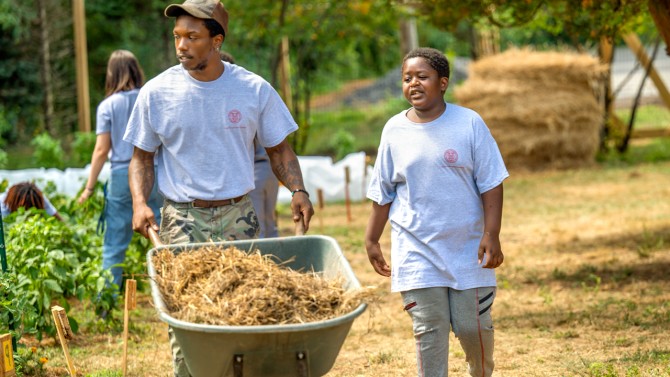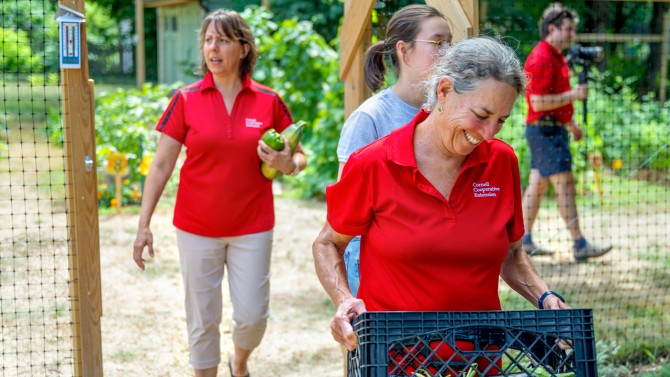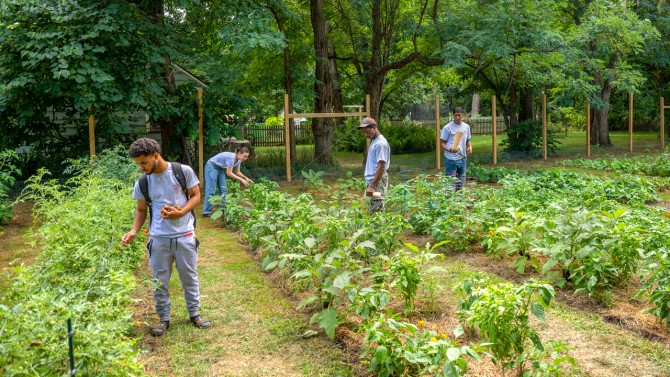Rochester farm brings opportunity, joy to at-risk young adults
Rochester farm brings opportunity, joy to at-risk young adults
By Caitlin Hayes, Cornell Chronicle
Just north of some of the most challenged neighborhoods in Rochester, a small farm is flourishing – and providing more than just food.
The half-acre farm, established in 2022 by Cornell Cooperative Extension Monroe County (CCE Monroe), is the site of a workforce training and transitional jobs program for young adults, 18 to 26, who face obstacles in finding or keeping employment.
“This is a population that just doesn’t have the opportunities everybody else has, and it’s not fair,” said Marci Muller, horticulture program leader for CCE Monroe and longtime advocate for at-risk young adults. “The purpose of our program is to help them build that workday structure into their life, to develop the soft skills: getting to work on time, being a good team member. When they’re at a point where they can hold on to a job, we help them find work.”
Part of CCE Monroe’s South Lawn Project, the GROWS program (Gaining Relevant and Outstanding Work Skills) is in its second year, with cohorts of five young adults moving through the program at a time; by the end of this year’s growing season, 15 employees will have worked on the farm, receiving stipends for their hours. With CCE, partnering nonprofits and agencies help the workers tackle the broader challenges that prevent them from finding and keeping employment, such as housing and financial insecurity or inconsistent access to internet, childcare and transportation.
“We know our limitations,” Muller said. “We’re not counselors, we’re not social workers, but when things are beyond our capacity, we know where to reach out for help.”
“This program is not what you expect,” said current employee Anthony Walker, 20. “They’re very caring people. When I was working in fast food places or things like that, nobody cared about what was really going on, but here – it’s like, they got you.”
The support made a difference in the program’s first season: Of the 10 young people who participated in 2022, three employees subsequently enrolled in school, and five more were employed six months after leaving the program.
Farm employees gain tangible skills – maintaining the infrastructure of the farm and learning how to grow, tend and harvest the crops – but also begin to imagine new careers for themselves, said Michael Kincaid, urban agriculture educator at CCE Monroe and farm manager for the South Lawn Project.
“These are transferable skills in terms of accuracy and attention to detail that they would use in any job,” Kincaid said. “Maybe even more important is that you see them considering careers they weren’t considering before, whether that’s in horticulture or not.”
Kincaid and Muller helped current employee Jordan Conyer, 21, find an additional part-time job and enroll in community college for the fall.
“They’ve helped me feel comfortable with certain goals I want to achieve,” said Conyer, who plans to study graphic design and enter a four-year college after completing his associate degree. “And the program gives you the opportunity to access jobs and the new things we’re learning. It’s a good thing.”
Conceived as an outdoor classroom, the farm is located on the south lawn of the CCE Monroe offices and, in addition to GROWS, provides opportunities for the community to learn about horticulture, urban farming, nutrition and more. Between 80 and 90 crop varieties are currently growing, and the harvested food is donated back to food pantries in low-income neighborhoods – the first delivery, made the last week of June, consisted of 36 pounds of food.
“In the neighborhood I grew up in particularly, there isn’t much access to foods that are good for you,” Conyer said. “That’s why I like programs like these because, with the knowledge that you get, you realize you can bring all of that stuff to yourself.”
Muller said she would love to expand the program’s footprint and bring urban gardening directly to the communities where Conyer and others live.
“Having more of a presence in the city would help a lot, if we could get access to more funding, a vacant lot, and have a mobile crew,” Muller said. “There’s a big push to empower people to grow their own food, to take back property in the city that is not being utilized, to beautify and improve communities. Having a satellite garden in the neighborhoods where our kids live would make a big difference for those communities and for our program.”
Already, the farm has shifted employees’ relationship to food. They take fresh produce home with them, and Kincaid uses fruits and vegetables from the farm to make lunches for the crew; they’ve made kohlrabi fries, mulberry jam, garlic scape pesto and more.
“There have been new flavors and things I’ve never tried or never even seen,” Walker said.
The employees said the knowledge of how to grow food is something that will stay with them, even if they don’t end up working in landscaping or agriculture.
“Thanks to this program, I know once I get my own place, I’m going to have my own plants,” said James Flanagan, 19, who hopes to attend community college, and eventually a four-year college, to pursue computer coding. “I definitely wouldn’t have done that without this program.”
Some current and past employees have discovered a more direct career interest in horticulture as well. Walker may be on that path – he left the program for two weeks, and when he returned, the change in the garden astounded him.
“When we first started, there was nothing there, literally nothing,” he said. “Coming back and just seeing the beauty in the garden – it really inspired me. It was a change for me. It’s like, wait, this is maybe something I want to do.”
Kincaid said there are many moments where he and the employees recover a childlike curiosity, a sense of joy and surprise.
“We’re walking the rows, taking a close look at the progress every day,” Kincaid said. “We see hawks, skunks, some bugs that we have no idea what they are. That kind of curiosity and wonder is really gratifying in and of itself.”
Employees recalled surprises, too: finding weeds that smell like peanut butter, discovering fennel’s black licorice flavor, catching and releasing a groundhog and a baby raccoon.
“It’s a peaceful environment, it brings peace to the mind,” Walker said. “We pay attention to the work here, and we do hands-on things that pertain to life. And we get everything you need to be able to move on.”
Media Contact
Get Cornell news delivered right to your inbox.
Subscribe




